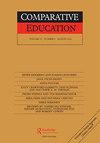实施教育改革——案例与挑战
IF 3.7
1区 教育学
Q1 EDUCATION & EDUCATIONAL RESEARCH
引用次数: 1
摘要
正如祖鲁人/科萨人所说的“Umuntu ngumentu ngabantu”所说的那样,“一个人通过他人成为一个人”……换句话说,我是通过他人的人性而成为我的”(第60页)。恩加拉的教育领导哲学和方法是基于“我是通过他人的人性而成为我”这一概念。从这个角度来看,领导力不是通过授予特定的领导角色而获得的荣誉,而是通过实践某些美德(即慷慨、好客、同情、关心和分享)而获得的成就——无论一个人在被分配的机构、专业或社会角色中扮演什么角色。这些是塑造真正领导力的美德。这本书的一个中心章节将乌班图的概念翻译成“仆人式领导”的概念。恩加拉认为,“仆人式领导”的一些特征包括:“仆人式领导是第一位的,领导力是第二位的”;“仆人式领导是发自内心的”,领导者在私底下的行为和在公开场合的言行应该保持一致;“仆人式领导者认识到人的潜力,并采取行动,使人们发挥出最好的一面”;仆人式领导者寻求的是赋予其他领导者和其他人权力,而不是控制他们。仆人领袖“不仅要对这一代人负责,也要对过去的几代人负责,更重要的是对未来的几代人负责”(第81-82页)。在最后一章,恩加拉概述了非洲学者和教育领袖面临的挑战。这包括他所说的“殖民主义”(“殖民者对被殖民人民的人性、文化和心理能力有一种预先确定的态度,这种态度往往以种族主义的形式表现出来”,第202页)和“民族主义民粹主义”(“这是对“黄金过去”的高估,对传统文化的消极方面视而不见”,第203页)的双重危险。殖民遗产必须在殖民者的种族主义遗产和前殖民地试图建立一种全新和解放的遗产两方面得到感受和理解。本书以附录结尾,专门为学生和感兴趣的实践者提供反思练习。这些对任何希望进一步反映本书论点的意义和含义的读者都是有帮助的,但作为学术发展和研究生教学背景下的教学资源特别有用。对于比较主义者来说,这本书肯定了跨越文化和专业界限的理解的重要性,并提供了对非洲教育领导观点的重要见解。本文章由计算机程序翻译,如有差异,请以英文原文为准。
Implementing educational reform—cases and challenges
as a philosophy is captured in the Zulu/Xhosa saying Umuntu ngumentu ngabantu “A person is a person through other people”... In other words, I am what I am through the humanity of others’ (p. 60). Ngara’s philosophy of – and approach to – educational leadership is grounded in this notion of ‘I am what I am through the humanity of others’. From this perspective, leadership is not an honour gained through the conferment of a particular leadership role, but an achievement earned – in whatever assigned institutional, professional, or societal role one fulfils – through the practice of certain virtues: namely, generosity, hospitality, compassion, caring and sharing. These are the virtuous dispositions that shape true leadership. One of the central chapters of the book translates the notion of Ubantu into the idea of ‘servant leadership’. Some of the characteristics of ‘a servant leader’, suggests Ngara, are that ‘[s]ervant leadership comes first and leadership second’; that ‘servant leadership comes from the heart’ and that there should be consistency between what leaders do in private and what they proclaim in public; that ‘[t]he servant leader recognizes human potential and acts to bring out the best in people’; that [t]he servant leader seeks to empower other leaders and other people, not to control them’; and that the servant leader ‘is not only accountable to the present generation but also to past generations and, more importantly, to future generations’ (pp. 81–82). In the final chapter Ngara outlines the challenges facing African academics and educational leaders. These include the twin dangers of what he terms ‘colonizerlity’ (‘The colonizer has a predetermined attitude about the humanness, culture and mental capabilities of the colonized people which tends to express itself in the form of racism’ p. 202) and ‘nationalistic populism’ (‘This is the overvaluing of “the golden past” and turning a blind eye to the negative aspects of traditional culture’ p. 203). The colonial legacy has to be felt and understood in both the racist heritage of the coloniser and the attempts by the formerly colonised to forge a radically new and liberated heritage. The book ends with an appendix devoted to ‘reflection exercises for students and interested practitioners. These are helpful for any reader whomay wish to reflect further on the significance and implications of the book’s arguments but are particularly useful as a pedagogical resource within academic development and postgraduate teaching contexts. For comparativists, this is a book that affirms the importance of understanding across cultural and professional boundaries and that provides important insights into African perspectives on educational leadership.
求助全文
通过发布文献求助,成功后即可免费获取论文全文。
去求助
来源期刊

Comparative Education
EDUCATION & EDUCATIONAL RESEARCH-
CiteScore
7.40
自引率
21.20%
发文量
35
期刊介绍:
This international journal of educational studies presents up-to-date information with analyses of significant problems and trends throughout the world. Comparative Education engages with challenging theoretical and methodological issues - and also considers the implications of comparative studies for the formation and implementation of policies - not only in education but in social, national and international development. Thus it welcomes contributions from associated disciplines in the fields of government, management, sociology - and indeed technology and communications - as these affect educational research and policy decisions.
 求助内容:
求助内容: 应助结果提醒方式:
应助结果提醒方式:


